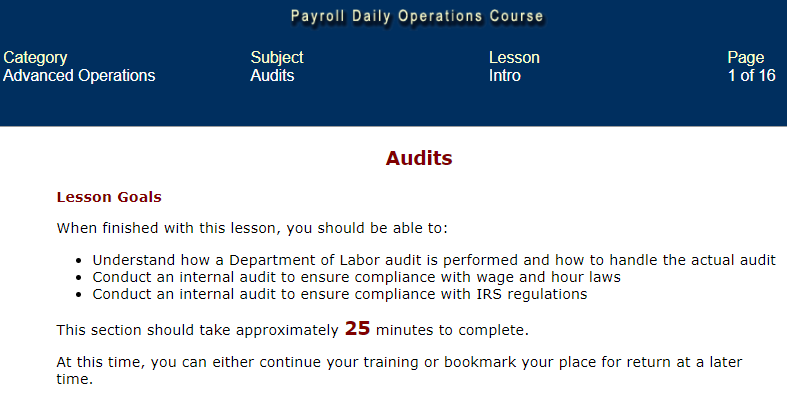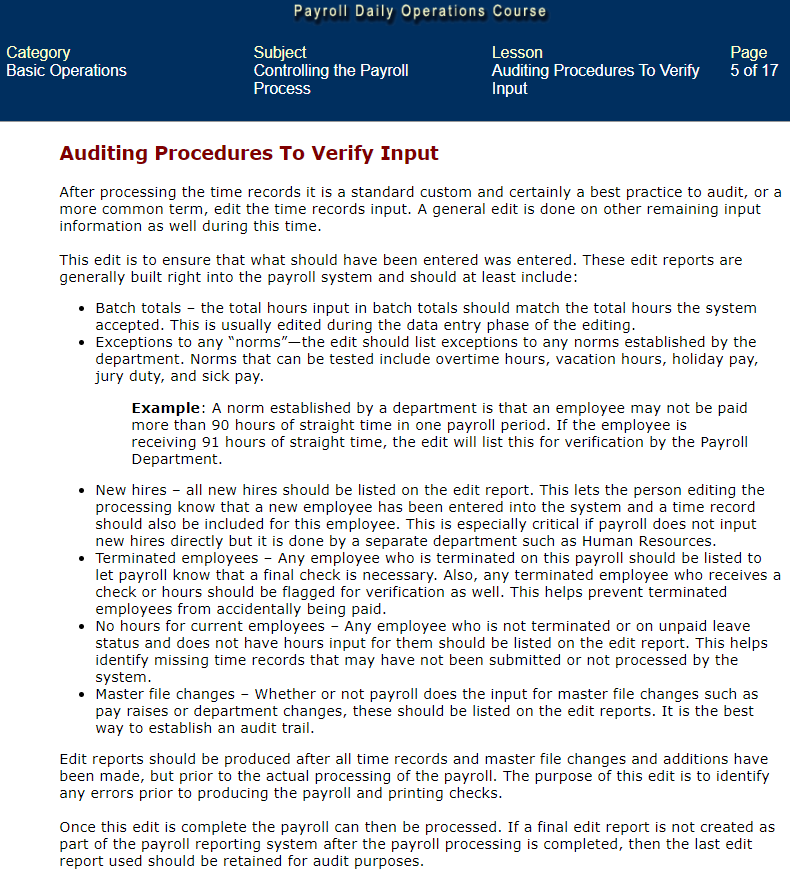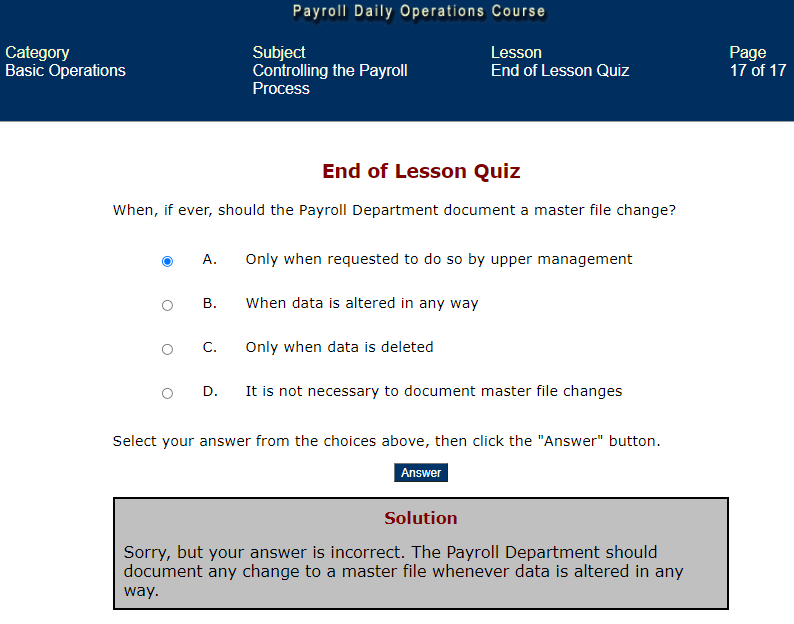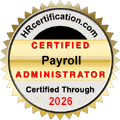Learn Best Practices And Earn A Payroll Professional Certification For Handling Payroll Daily Operations
The Payroll Operations Training & Certification Program helps beginning and intermediate HR professionals learn the basic payroll requirements.
The Program includes plain-English descriptions of the various requirements, processes, and procedures, as well as numerous examples, administrative tips, and interactive Q&A to help provide valuable insight into compliance requirements.
The Program also includes an optional test for those who wish to earn a "Certified Payroll Operations Administrator" designation. This Program also qualifies for eight hours of PHR and SPHR re-certification credits!
What You'll Learn:Here is just some of what you will learn from our Payroll Operations training course, including how to:
- Maintain accurate payroll records, such as hours worked, pay, and tips and tax amounts
- Track, pay, and report Social Security, Medicare, and Federal Unemployment Tax Act (FUTA) deductions
- Track and process exemptions, fringe benefits, retirement plan deductions, garnishments, levies, and other deductions
- Distribute payments through checks, paycards, and/or direct deposit
- Retain records and forms, such as I-9s and eVerify
- Comply with various wage and hour laws and IRS regulations
- Establish and maintain self-service systems, direct deposits, and paycards
- Select and implement a payroll system
- Develop audit and disaster recovery plans
- Comply with various state and federal record retention requirements
About The Payroll Operations Training &Certification Program
This course is sold as an annual subscription with four components: the training course itself; access to all training materials as a resource for one full year; free updates whenever the law changes, and; a Certified Administrator designation. Access to resource materials, free updates, and a new Certificate are available for subsequent years for a low renewal fee of $99 per year.
Excerpts From Our Certified Payroll Certification Program For Payroll Operations
Below are a couple of samples from our payroll operations training course. These excerpts provide a quick overview of payroll requirements that someone new to payroll might not have even heard of; instructions for completing the forms, dates for submission, making changes or correcting errors, etc. are included in the course itself.
Want to see more of what is covered? Click here to see the complete list of topics covered by this course.
Program Demo: How The Payroll Certification Course For Payroll Operations Works
Our Payroll Operations Training & Certification Program includes training that meets instructional design requirements. Namely, each Lesson starts with a Lesson Goals page that outlines the key items that will be taught in that Lesson, followed by multiple pages of training, and concluding with End Of Lesson Quizzes that test against the lesson goals. Read futher for visuals and further explanations.
Lesson GoalsEach self-paced Training & Certification Program is delivered right to your desktop at the time you choose, and is loaded with information, examples, administrative tips, and interactive questions to help you understand and comply with Federally-mandated rules and regulations. You'll learn proactive design and administrative options, as well as key compliance processes and procedures to help reduce costs and health care claims, starting with a Lesson Goals page that tells you what you'll learn in that lesson.

Benefit From Great Content, Easy To Use NavigationEach of our Training & Certification Programs includes great training content, written in non-legal terms and supported with numerous tips, examples, and procedural recommendations. "Glossary" and "Help" buttons also are included, as well as a special "Bookmark" feature so you can save your place as needed.

End Of Lesson QuizLesson goals and learned content are tested through interactive questions during and at the end of each lesson. Answers to each question are provided right on that page to give you immediate feedback.
 Certification
Certification
And don't forget: upon completion of the Training portion of your Program, you can test for "Certification". Certification helps provide confidence to Managers that the person handling Payroll has a good understanding of the complex requirements necessary for proper compliance.
Want To Become A Certified Payroll Clerk? Enroll In Our Payroll Courses!
Choosing to enroll in payroll courses is a powerful step toward building a rewarding career in the payroll field. Our training provides the essential skills and knowledge you need to handle payroll and employees deductions, manage payments payroll accounting, and understand complex financial transactions accurately.
With a curriculum designed for differing educational backgrounds, our courses allow you to study at your own pace while gaining the skills needed to excel in payroll management and accounting.
The payroll industry values individuals who demonstrate payroll competency and are well trained in industry standards. Our classes target professional development by preparing you for the payroll certification exam and, ultimately, a certified payroll professional certification. Successfully completing our program and successfully passing your certification exam not only boosts your confidence but also assures employers and hiring managers that you meet industry benchmarks.
Whether you're aiming for entry-level roles at small businesses or advancement within large corporations, our fundamental payroll certification courses address the realities of employees deductions, payroll accounting, compliance, and reporting that payroll professionals must master daily.
We also recognize that payroll managers and those in professional services or other organizations need up-to-date training to stay competitive in today's market to. Using updated resources, our interactive online training will help students develop practical skills and confidence to thrive.
Take control of your professional growth and enroll today. Position yourself as a vital asset in the payroll profession. Let us help you advance with the right certification and a robust understanding of payroll operations.
Top FAQs
Payroll is much more than just handing out paychecks, and includes a variety of responsibilities such as handling garnishments, travel pay, multi-state taxation, unclaimed paychecks, and much more in a timely and accurate fashion.
In business since the mid-1990's, we have over 25 years of experience delivering high-quality training content via seminar, webinar, online, and other formats. Each of our courses are delivered by an industry expert who will share his or her years of experience to help you be in compliance, smarter, and more productive, and almost all offer SHRM and HRCI credits.
Time clocks, time sheets, and electronic methods are a couple ways to track hours worked.
In addition to ensuring that employees are paid correctly and on time, "Payroll" has numerous time and reporting requirements. The primary payroll areas include paychecks, reporting, operations, and management.
Maintaining accurate payroll records, such as hours worked, pay, and tips and tax amounts, obeying federal and state rules, and submitting required reports on a timely basis.
While many payroll-related regulations are federally-governed, there also are many state requirements, including those for handling garnishment, final paychecks, and unclaimed paychecks. Each state's requirements differ in the details, so be sure to check your state's requirements by clicking the applicable link(s) at the bottom of this page.
Payroll Administrators must be able to:
- Properly "classify" workers
- Apply the various exemptions
- Calculate gross pay and properly make deductions
- Correctly identify, pay, and withhold taxes for employees
- Administer deferred compensation, cafeteria plan, sick pay, and other compensation
- Handle stock options, expense reimbursements, relocation, and other "expenses"
- Follow the proper policies, procedures, and documentation requirements for garnishments and levies
- Properly complete and file all required reporting requirements
- Correctly complete year-end requirements and establish year-beginning requirements
- Implement and maintain fraud, audit, disaster recovery, and record retention processes and procedures


 770-410-1219
770-410-1219





